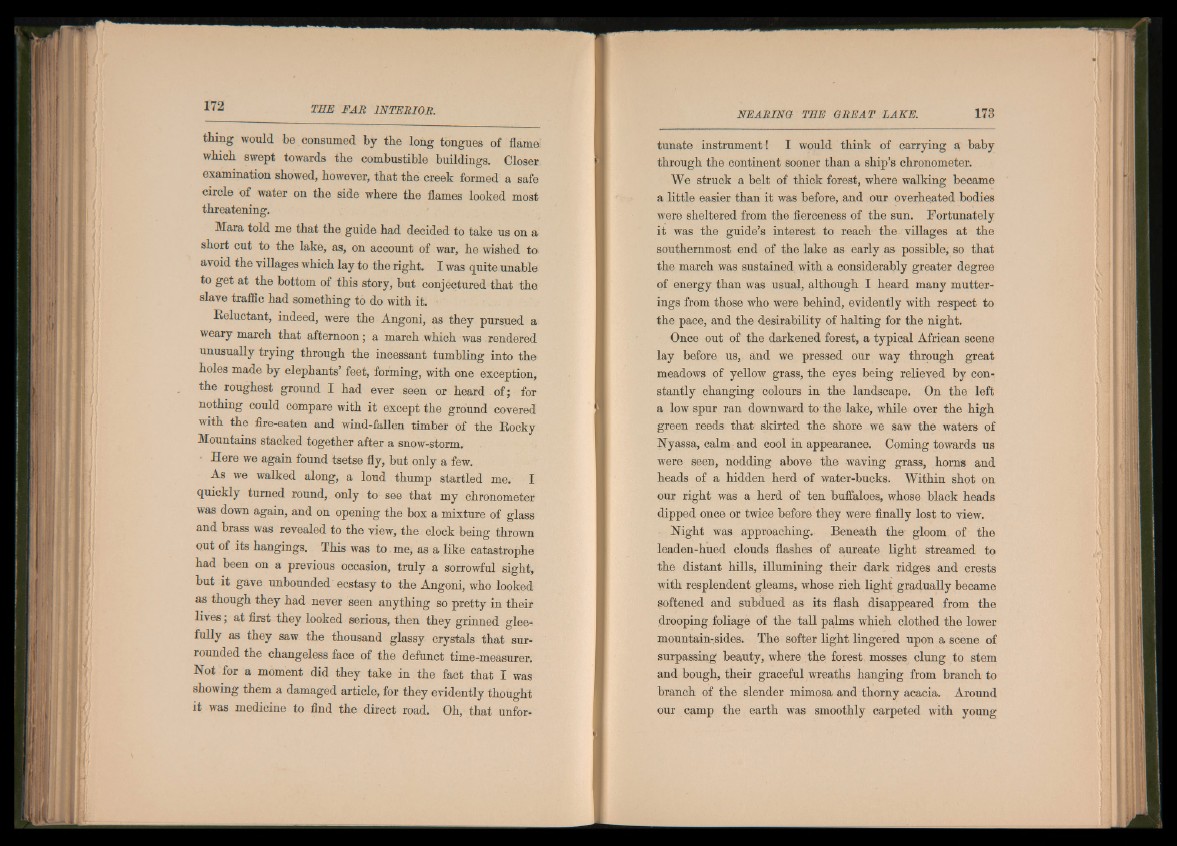
thing would be consumed by the long tongues of flame:
which swept towards the combustible buildings. Closer
examination showed, however, that the creek formed a safe
circle of water on the side where the flames looked most
threatening.
Mara told me that the guide had decided to take us on a
short cut to the lake, as, on account of war, he wished to
avoid the villages which lay to the right. I was quite unable
to get at the bottom of this story, but conjectured that the.
slave traffic had something to do with it.
Reluctant, indeed, were the Angoni, as they pursued a
weary march that afternoon; a march which was rendered
unusually trying through the incessant tumbling into the
holes made by elephants’ feet, forming, with one exception,
the roughest ground I had ever seen or heard of; for
nothing could compare with it except the ground covered
with the fire-eaten and wind-fallen timber of the Rocky
Mountains stacked together after a snow-storm.
• Here we again found tsetse fly, but only a few.
As we walked along, a loud thump startled me. I
quickly turned round, only to see that my chronometer
was down again, and on opening the box a mixture of glass
and brass was revealed to the view, the clock being thrown
put of its hangings. This was to me, as a like catastrophe
had been on a previous occasion, truly a sorrowful sight,
but it gave unbounded' ecstasy to the Angoni, who looked
as though they had never seen anything so pretty in their
lives; at first they looked serious, then they grinned glee-
fully as they saw the thousand glassy crystals that surrounded
the changeless face of the defunct time-measurer.
Not for a moment did they take in the feet that I was
showing them a damaged article, for they evidently thought
it was medicine to find the direct road. Oh, that unfortunate
instrument ! I would think of carrying a, baby
through the continent sooner than a ship’s chronometer.
We struck a belt of thick forest, where walking became
a little easier than it was before, and our overheated bodies
were sheltered from the fierceness of the sun. Fortunately
it was the guide’s interest to reach the villages at the
southernmost end of the lake as early as possible, so that
the march was sustained with a considerably greater degree
of energy than was usual, although I heard many mutter-
ings from those who were behind, evidently with respect to
the pace, and the desirability of halting for the night.
Once out of the darkened forest, a typical African scene
lay before us,, and we pressed our way through great
meadows of yellow grass, the eyes being relieved by constantly
changing colours in the landscape. On the left
a low spur ran downward to the lake, while over the high
green reeds that skirted the shore we saw the waters of
Nyassa, calm and cool in appearance. Coming towards us
were seen, nodding above the waving grass, horns and
heads of a hidden herd of water-bucks. Within shot on
our right was a herd of ten buffaloes, whose black heads
dipped once or twice before they were finally lost to view.
Night was approaching. Beneath the- gloom of the
leaden-hued clouds flashes of aureate light streamed to
the distant hills, illumining their dark ridges and crests
with resplendent gleams, whose rich light gradually became
softened and subdued as its flash disappeared from the
drooping, foliage of the tall palms whieh clothed the lower
mountain-.sides. The softer light lingered upon a scene of
surpassing beauty, where the forest mosses clung to stem
and bough, their graceful wreaths hanging from branch to
branch of the slender mimosa and thorny acacia. Around
our camp the earth was smoothly carpeted with young